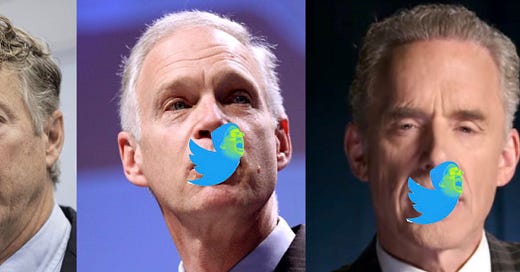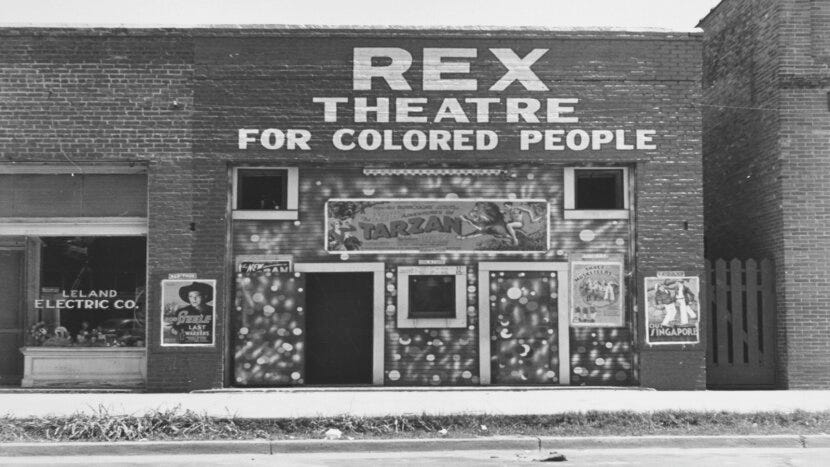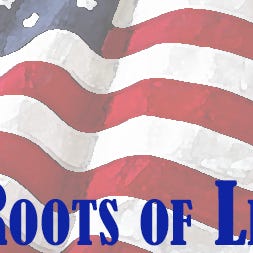A few days ago, the Fifth Circuit Court of Appeals upheld a Texas law that prohibited Big Tech from censoring content on their platforms. This is being heralded as a big win for free speech by Texas governor Jim Abbott and many others on the Right.
Libertarians aren't quite as thrilled.
The crux of the matter is that the First Amendment only prohibits the government from infringing on speech. Private entities such as Google, Facebook, and Twitter, no matter that they are large and near-monopolistic in their spaces, aren't subject to 1A's strictures. That they've become the de facto "public square" - or that some claim they have - should be irrelevant. I won't get into the merits of the "public square" argument, other than to note that Twitter's political chatter is a scant few (call it about 2% of the populace) yelling at each other.
Or, maybe I will.
I remain skeptical of this effort to impose an analogue of the FCC's Equal Time Rule, or the now-defunct Fairness Doctrine, believing that any such attempt would be subject to regulatory capture, would prompt Big Tech to quash everything (see: Yeshiva University cancelling all its clubs rather than allowing an LGBTQ club as demanded by the courts), would stifle competition and thwart challengers to the dominant players, or would otherwise impair the marketplace of ideas.
That said, I do try to revisit my viewpoints as I encounter new information, and I had a hint of one percolate up from the depths of my lizard brain as I read the news out of the Fifth Circuit.
Consider the Public Accommodation (PA) principle. Born of the Jim Crow era, where state or local governments overtly required businesses to discriminate between white and "colored," it puts forth the notion that economic activity that physically interacts with the public is as much a privilege as it is a right, and therefore the government has the authority to set rules for that activity. This led to the Civil Rights Act of 1964's prohibition on businesses discriminating by skin color, etc. (whereas before, they were required to).
While the government is absolutely within its rights to set such rules for government (i.e. "public") activities and 'storefronts,' many who held liberty paramount took issue with the expansion of the PA principle to private-sector mandates being written into the law, arguing that it violated freedom of association and assembly.
Those many were correct - PA mandates on private businesses are not libertarian, and are a violation of individuals' rights in a free society. The "however" to this is that the society was not free, that individuals' rights were already being violated by the government, and that the more organic path, i.e. repeal/override the laws and let market forces sort things out - would have taken much longer to achieve the goal of upending public-space discrimination.
This made PA a "lesser evil,” a step forward in what I call the “A to B problem.” It also acknowledged Martin Luther King’s observation that "a right delayed is a right denied." From that perspective, the blunt-force aspect of PA rules for private businesses serves better than a more naturally evolutionary path.
I've argued in the past, and still believe, that the the utility of PA requirements on private businesses has long expired, that they're now just cudgels for the cynical, the self-serving, and bottom-dwelling serial-suers, and that organic and evolutionary forces would better challenge and remedy those who'd discriminate. In other words, it’s time to take the next step toward liberty and end those requirements.
PA is still the law of the land, though, and given the current wave of illiberalism and unequal treatment, perhaps we might borrow from Alinksy and make those who don’t respect liberty live up to their own rules.
If we change the basis of discrimination from demographic markers to political opinion, and if we change the "storefront" from physical to digital, it's easy to apply the PA principle to social media and Big Tech.
As I mentioned, I'm still masticating the idea, and PA remains as illiberal applied to cyberspace as it is applied to brick-and-mortar. But, as a transitional "lesser evil," it might have utility in reminding Big Tech that discrimination is a Bad Thing, no matter its basis. I remain hesitant, both because a private entity cannot but engage in curation and editorial discretion in what appears on its pages, because it’s not discriminatory to say “we will not allow incitement or crime on our site.” There's also the obvious parallel with the excesses associated with PA today, six decades after it was legislated. Adding tools to the government's toolbox means they will inevitably be misused or abused at some point.
That said, there is nuance, and there are precedents at play. If the courts or the Court come up with a public-accommodation caveat to Big Tech's right to manage content on its platform, it mightn't be the worst thing in the world, at least as a transitional state response to an evolving technological phenomenon. A court precedent might be less “capturable” than legislation.
Big Tech's arguments that they need the freedom to protect their customers against violence and evil are laughable given their blatant excesses in stifling speech that is right-of-left. They’re certainly more oppressor than oppressed in this matter, and if they were subject to the same sort of rules that small businesses have had imposed on them, I’d not cry too hard. Perhaps if they behaved in an upright and non-discriminatory manner, there’d be much less call for intervention.
Thank you for reading! If you enjoy The Roots of Liberty, please subscribe (if you have already, thank you!), and please recommend the blog to your friends. Social media has proven wholly unreliable in sharing my posts, subscribing is mightier than the shadow-banners, and subscriptions motivate my productivity.
If you really like The Roots of Liberty and want to help keep it rolling, please consider becoming a paying subscriber here at Substack, or at a lighter level as contributor to the blog via Patreon. I’ve started offering an expanded serialization of my short book, “End the War On Drugs,” every Sunday, for my paid subscribers.
Chapter 1 - A Catastrophic Failure
Chapter 2 - A Brief History
Chapter 3 - A Society Rooted in Individual Liberty
Chapter 4 - Use vs Abuse
Chapter 5 - Societal Cost
Thank you, again, for your support!
Peter.







There is a libertarian argument that a private business has the right to discriminate and that the competitive free market will punish companies that turn away paying customers and qualified job applicants for no good reason. But, as you say, the “organic” option is not always viable. As unfair as it would be to label this view as “racist”, we can’t deny that it would be embraced by racists, putting libertarians in bad company and preventing any kind of rational discussion. This comes under the heading of “pick your battles”.
A collection of agreements on points, assuredly.
As a model i also remember (years back) when the IRS was forced out into the public court system where it could not as easily beat the taxpayer about head/shoulders.
Note that my concern is to create an auditable recourse for those being maligned by BigTech, as they control both transport and content their invincibility is probably more insidious then the TPC.
In the days pre-Judge Greene when TPC (aka Bell Telephone) only controlled transport it was bad, but that currently BigTech offers the only show in town, controls where you sit, and moderates your right to speak, all should see this behaviors breadth and history, if one might say a list of abuses and usurpations.
Admittedly all systems and services need adjusting, as does the adjusting need adjusting. I think we are past the tipping point of abuse, and if the rebound causes a major reduction in asocial media scope and reach, its likely time for its demise.
Many of us never thought its roots would make it past a year, perhaps its long overdue to have another pointless reason to keep our faces stuck in the Nu-boobtoob lost to history.
but... thanks again for the discussion.